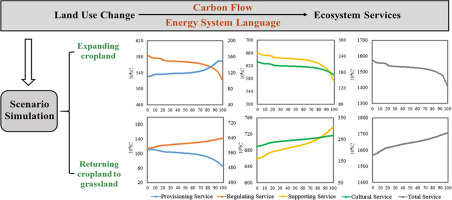Science of the Total Environment ( IF 9.8 ) Pub Date : 2018-10-18 , DOI: 10.1016/j.scitotenv.2018.10.206 Zihan Xu , Weiguo Fan , Hejie Wei , Peng Zhang , Jiahui Ren , Zhicheng Gao , Sergio Ulgiati , Weidong Kong , Xiaobin Dong

|
Land use change affects ecosystem services by changing the structure and function of ecosystems. Carbon flows throughout natural and socioeconomic systems can effectively reveal this process. The Manas River Basin has experienced rapid oasis expansion for decades, and land use change in the basin is very typical. Oasis expansion has caused a large amount of cropland to invade natural vegetation, thus affecting ecosystem services. This study used a biomass-based ecosystem service estimation model to assess changes in ecosystem services in the Manas River Basin. The carbon flow model was constructed using energy systems language, and the future development of ecosystem services was simulated based on different land use scenarios. The results show the following: (1) From 1980 to 2015, the river basin provisioning service was continuously optimized, while the regulating, supporting and cultural services were reduced. (2) If the expansion of cropland continues, then carbon will be transferred from the natural ecosystem to the cropland. Regulation, support and cultural services in the basin continue to decrease. Due to the shortage of water resources in the basin, the growth of provisioning services is limited. (3) If the project of returning cropland to grassland is implemented, then the carbon in the natural ecosystem will gradually recover. The regulating, supporting and cultural services of the river basin are rising, but provisioning services are gradually decreasing. In general, the model based on energy systems language can reflect the ecological process within the system and effectively reveal the carbon flow process between ecosystems. The use of carbon to quantify ecosystem services can harmonize dimensions, facilitate comparisons, and mitigate errors in outcomes due to different evaluation criteria or subjective factors. Therefore, this study combines energy systems language with carbon flow, which helps to more rationally explore the impact of land use change on ecosystem services, thereby providing valuable information for river basin management.


























 京公网安备 11010802027423号
京公网安备 11010802027423号